“Failure!” says Ian Brown. “Big failure.”
The feature writer and broadcaster is talking about his failure — to write a book he still owes Random House, the chronicle of a car high-jacking and kidnapping. We’re well into our conversation that began about an hour earlier, just after 8 a.m., when he burst through the wooden doors of Bar Mercurio, an Italian restaurant in Toronto’s Annex neighbourhood, and ordered a mushroom omelette, side of potatoes and coffee. “I don’t usually eat this much in the morning,” he explained. Later, in his car, Brown will look in the rear-view mirror, see that the heavy folds beneath his eyes are puffier than usual, and say, “Jesus! Oh fuck! I look like I didn’t go to bed last night.”
 On this chilly October morning, Brown wears only a suit; he forgot his overcoat at the International Festival of Authors’ “opening blowout” the previous evening, where there were “writers, drinking constantly. I end up drinking too much and having hangovers.” He liked the party, but it was depressing, he says, returning to the subject of failure: “Because you’re surrounded by people who have just written really successful books.”
On this chilly October morning, Brown wears only a suit; he forgot his overcoat at the International Festival of Authors’ “opening blowout” the previous evening, where there were “writers, drinking constantly. I end up drinking too much and having hangovers.” He liked the party, but it was depressing, he says, returning to the subject of failure: “Because you’re surrounded by people who have just written really successful books.”
At 53, Brown is a Canadian media mini-celebrity. His talent and big “I” charm come through in all he does: his newspaper and magazine writing; his books, Freewheeling and Man Overboard,plus editing and contributing to What I Meant to Say, a collection of essays by and about men; and his broadcasting, as host of CBC Radio’s Talking Books and two TVO documentary series,The View From Here and Human Edge. By any measure he has had major career success. So why does he seem so fixated on failure?
Brown will admit to worrying about measuring up to the great nonfiction writers he admires, such as Nicholson Baker, Tom Wolfe and Garrison Keillor. A long-time friend has said of him, “He wants to be among the best, anywhere.” But when I ask Brown what he wants to be remembered for, he begins by saying: “I’d like [my daughter] Hayley to remember me nicely. That’s most important. To be good company. Good in bed — that’d be nice.” Reflective pause. “It would be nice if someone remembered me as a good writer. I’d much rather they kept reading me. They pick up the book. They read something, ‘Oh, that’s good. Oh, that’s Brown.’”
Much of what he writes is good, really good; nearly every person interviewed for this feature can recall a favourite Brown piece, a few citing newspaper articles 20 years old. However, even some of his biggest boosters say that, lately, his writing is too often superficial and lacks great import.
Brown’s high school English teacher says his student was “a natural,” blessed with a “golden tongue.”Toronto Life called him a “legendary journalist” by age 35. He was, in many ways, the golden boy of Canadian journalism: articulate, smart, with an equally accomplished spouse and a large circle of friends. But what most people didn’t see was the hell he put himself through while writing. Then, in 1996, came the event that would forever change his life: the birth of a severely disabled son, Walker, who a friend describes as Brown’s “great grief, his great madness.”
Now he is about to embark on the writing challenge of his life: a book-length memoir about Walker. It could be the work that puts him right up there with Baker, Wolfe and Keillor, as well as other favourites, John McPhee, Ian Frazier, Calvin Trillin and Joan Didion.
But Brown, the natural born writer with a strutting kind of confidence, is no Norman Mailer when it comes to public braggadocio about his work. He often seems to prefer to hide behind a façade of self-deprecation. Of his book on Walker, Brown, sipping the morning coffee that may ease his hangover, says simply: “I don’t know if it’ll be interesting to anybody.”
To read the rest of this story, please see our ebook anthology: RRJ in Review: 30 Years of Watching the Watchdogs.
It can be purchased online here.
About the author
Julia Belluz was the Editor for the Spring 2007 issue of the Ryerson Review of Journalism.


